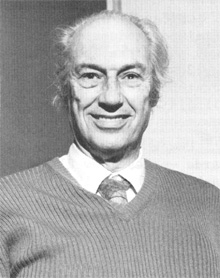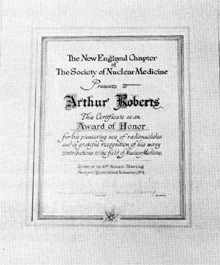Arthur Roberts Honored for Pioneering Research

Arthur Roberts
Fermilab physicist Arthur Roberts has been honored by the New England Chapter of The Society of Nuclear Medicine for the role he played in the development of radioactive iodine for medical diagnostics. Dr. Roberts was a research associate at the Massachusetts Institute of Technology and, along with Robley D. Evans, participated in the pioneering research initiated by the late Dr. Saul Hertz in the late 30's and early 40's which established the usefulness of radioactive iodine in research in thyroid metabolism and the treatment of thyroid disease. Isolating the iodine isotope in their pioneering study, they found that when administered to rabbits the iodine could be detected in the thyroid gland just a few minutes later. Foreseeing this to be an important application of the results of their basic research they sought and obtained funds to build the cyclotron at MIT, completed in 1941 under the direction of M. Stanley Livingston for the production of the radioactive iodine.
As a consequence of this pioneering work and later follow-up studies, radioactive iodine is now routinely used as a tracer in the diagnosis of thyroid disorders. In larger quantities it is used to deliver radiation to the thyroid for the treatment of several types of thyroid disease, including cancer of the thyroid.
In 1942 Dr. Roberts moved to the MIT Radiation Laboratory where he worked on the development of microwave radar.
Important research is one of two lanes in Arthur Roberts' traffic pattern. At the same time that he studied for his master's degree in physics at Columbia University, he was a student at the Manhattan School of Music, majoring in piano, receiving degrees from both schools simultaneously in 1933. At this crossroad he chose physics, "when I realized that if I chose music, I would have to give up physics, but the music could go along with the physics," he points out. His Ph.D. in physics from New York University followed.
Capturing a fellow Manhattan music student as his wife, Arthur (and now Janice, too) pursued their musical bent in Cambridge during the MIT years. In addition to his isotope work, Arthur taught at the New England Conservatory of Music and wrote his first two musicals.
In the years that followed, the Roberts, their research and their music moved from MIT to the State University of Iowa, to the University of Rochester, to the Argonne National Laboratory and the University of Chicago, and to Fermilab in 1967. Arthur's "Overture for the Dedication of a Nuclear Reactor," was performed by the Rochester Philharmonic. At the University of Chicago he also became interested in computer-produced music.
Recently, Dr. Roberts has been involved in another piece of unusual research, this time a study of the possibility of using the ocean as a giant detector of neutrinos. He told a Fermilab seminar recently that devices located five kilometers down in the ocean may prove useful as detectors for neutrinos with energies ten to a hundred times higher than that of Fermilab neutrinos. Such a device might also detect supernova explosions in distant galaxies up to ten million light-years away where the neutrinos originated. The possibility of locating such a detector off the coast of Hawaii will be the subject of a workshop at the University of Hawaii next September, which he is leading.
Meanwhile, as one of the stars of "The Physical Revue" performed by physicists and physicist's wives at the April meeting of the American Physical Society in New York, Arthur joshed and spoofed the profession in what a New York Times reviewer called "a medley of staggering variety." He returned home in time to help Janice direct the Hyde Park group in their performance of the Gilbert and Sullivan operetta "The Gondoliers." It was their 17th joint musical production. They both agree that the camaraderie and the excitement of producing a musical keep them coming back for "just one more."

Arthur Roberts' Reward of Honor


